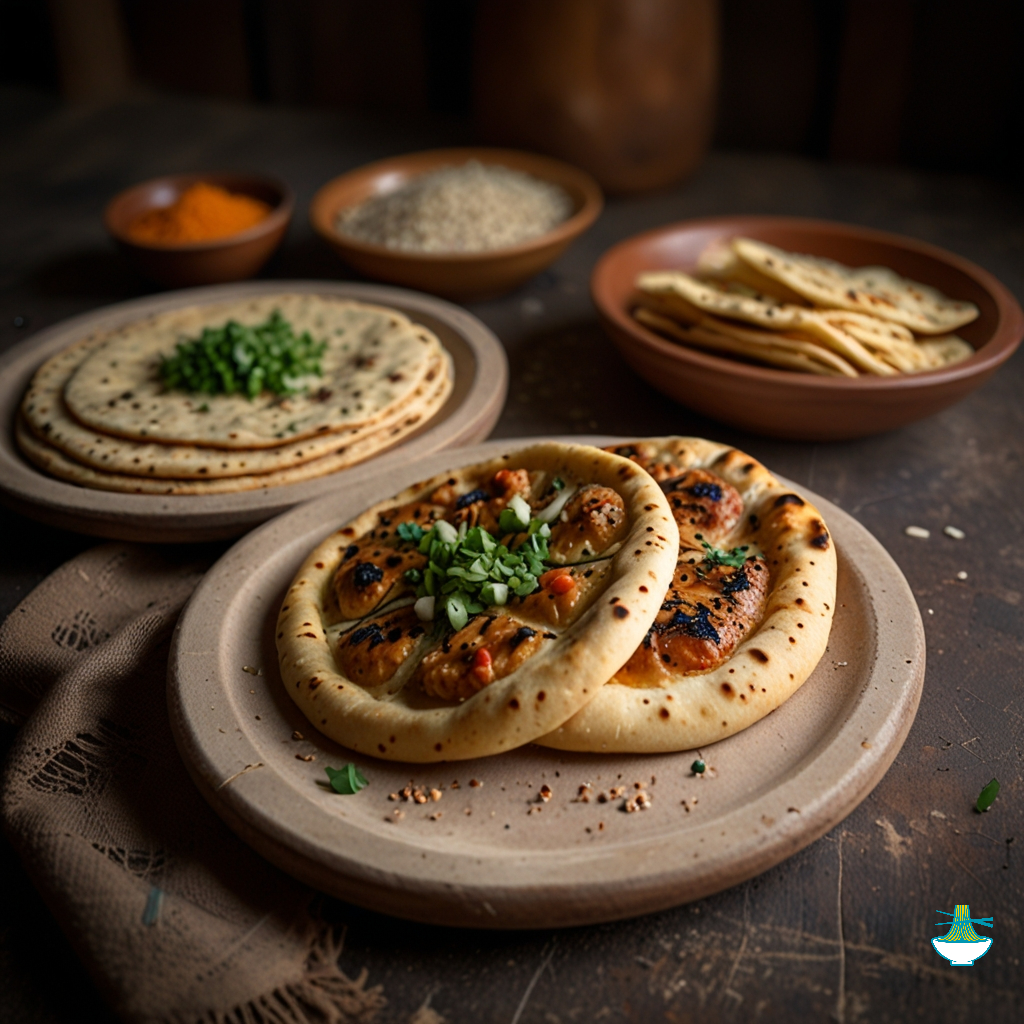Uzbek Non is a traditional flatbread that holds a significant place in Uzbek cuisine and culture. Baked in clay ovens known as tandirs, Non can be either plain or adorned with sesame seeds, adding a delightful flavor and texture. This bread serves as a staple accompaniment to various meals in Uzbekistan, complementing dishes ranging from hearty stews to grilled meats.
The history of Non dates back centuries, with roots in Central Asian culinary traditions. Its preparation and baking in tandirs reflect the region's rich cultural heritage, where communal gatherings and feasts often feature this fragrant and versatile bread. The simplicity of its ingredients and the traditional baking method contribute to Non's popularity both locally and internationally, showcasing the artistry and flavors of Uzbek cuisine.
Here's a clear and uncomplicated recipe for Uzbek Non flatbread:
Ingredients:
- 3 cups all-purpose flour
- 1 teaspoon salt
- 1 teaspoon sugar
- 1 tablespoon active dry yeast
- 1 cup warm water
- 2 tablespoons vegetable oil
- Sesame seeds (optional, for topping)
Method of Preparation:
1. In a mixing bowl, combine the flour, salt, and sugar.
2. In a separate bowl, dissolve the yeast in warm water and let it sit for 5-10 minutes until frothy.
3. Pour the yeast mixture into the flour mixture and add the vegetable oil.
4. Mix everything together until a dough forms.
5. Knead the dough on a floured surface for about 5-7 minutes until it becomes smooth and elastic.
6. Place the dough in a greased bowl, cover with a damp cloth, and let it rise in a warm place for about 1 hour or until doubled in size.
7. Preheat your oven to 450°F (230°C) and place a baking stone or baking sheet inside to heat up.
8. Punch down the risen dough and divide it into equal-sized balls.
9. Roll out each ball into a flat round shape, about 1/4 inch thick.
10. Optional: Sprinkle sesame seeds on top of the flattened dough rounds.
11. Carefully transfer the dough rounds onto the hot baking stone or sheet.
12. Bake for 8-10 minutes or until the bread is puffed and golden brown.
13. Remove from the oven and let it cool slightly before serving.
Enjoy your freshly baked Uzbek Non flatbread with your favorite dishes!
Nutrition Value:
1. All-Purpose Flour
- Calories: About 455 calories per cup (approx. 1365 calories for 3 cups)
- Carbohydrates: Approximately 95 grams per cup (285 grams for 3 cups)
- Protein: Around 13 grams per cup (39 grams for 3 cups)
- Fat: Minimal, about 1 gram per cup (3 grams for 3 cups)
- Sodium: Low, typically less than 10 milligrams per cup (less than 30 milligrams for 3 cups)
- Cholesterol: Zero cholesterol content
- Vitamins and Minerals: Contains small amounts of iron, folate, and niacin
- Nutritional Benefits: Provides energy from carbohydrates, some protein for muscle repair and growth, and a small amount of essential nutrients like iron and B vitamins.
2. Salt
- Calories: Negligible, usually less than 5 calories per teaspoon
- Carbohydrates: Virtually zero
- Protein: Negligible
- Fat: None
- Sodium: Approximately 2300 milligrams per teaspoon
- Cholesterol: None
- Vitamins and Minerals: No significant vitamin or mineral content
- Nutritional Benefits: Adds flavor to the dough but should be used in moderation due to its high sodium content.
3. Sugar
- Calories: About 15 calories per teaspoon
- Carbohydrates: Approximately 4 grams per teaspoon
- Protein: None
- Fat: None
- Sodium: Minimal, typically less than 1 milligram per teaspoon
- Cholesterol: None
- Vitamins and Minerals: No significant vitamin or mineral content
- Nutritional Benefits: Adds sweetness to the dough but should also be used sparingly due to its calorie content.
4. Active Dry Yeast
- Calories: Very low, negligible in practical terms
- Carbohydrates: Minimal, mostly from fiber
- Protein: A small amount, around 2-3 grams per tablespoon
- Fat: Minimal, usually less than 0.5 grams per tablespoon
- Sodium: Low, typically less than 10 milligrams per tablespoon
- Cholesterol: None
- Vitamins and Minerals: Contains B vitamins, particularly B1 (thiamine), B2 (riboflavin), and B3 (niacin)
- Nutritional Benefits: Acts as a leavening agent, helping the dough rise, and provides some B vitamins important for energy metabolism.
5. Warm Water
- Calories: Zero
- Carbohydrates: None
- Protein: None
- Fat: None
- Sodium: None
- Cholesterol: None
- Vitamins and Minerals: None
- Nutritional Benefits: Hydrates the dough and helps activate the yeast for proper fermentation.
6. Vegetable Oil
- Calories: About 120 calories per tablespoon
- Carbohydrates: None
- Protein: None
- Fat: Approximately 14 grams per tablespoon
- Sodium: None
- Cholesterol: None
- Vitamins and Minerals: Contains vitamin E and small amounts of vitamin K
- Nutritional Benefits: Adds moisture and richness to the dough, and provides some vitamin E, an antioxidant.
7. Sesame Seeds (optional, for topping)
- Calories: Around 52 calories per tablespoon (depends on the amount used)
- Carbohydrates: Approximately 2 grams per tablespoon
- Protein: Around 2 grams per tablespoon
- Fat: Approximately 4 grams per tablespoon
- Sodium: Minimal, usually less than 5 milligrams per tablespoon
- Cholesterol: None
- Vitamins and Minerals: Contains calcium, iron, magnesium, and zinc
- Nutritional Benefits: Adds texture, flavor, and some essential minerals like calcium and iron to the finished product when used as a topping.


Comments